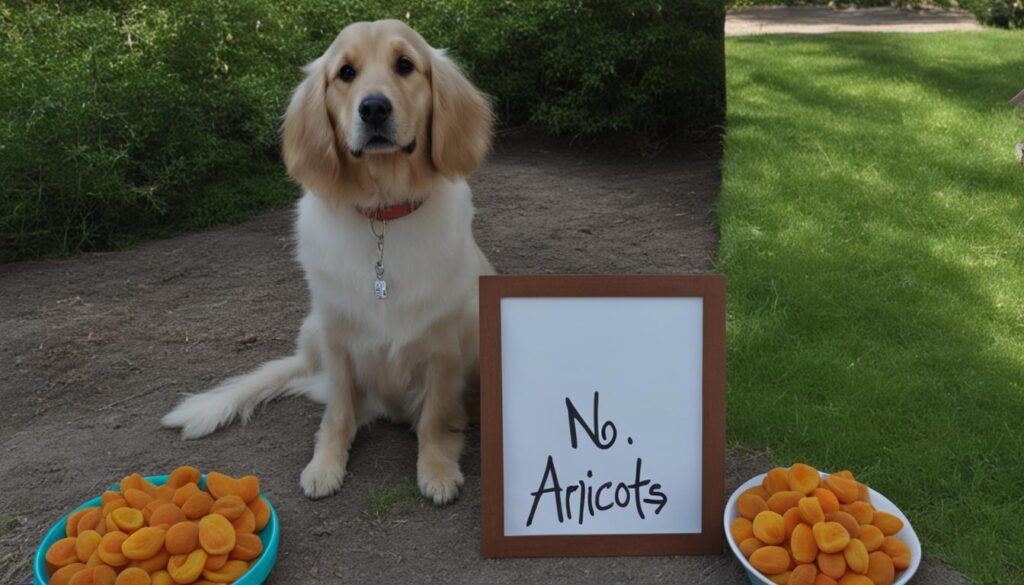Can Dogs Have Dried Apricots? Safety Guide
When it comes to feeding fruits to your dog, there’s always a lot of misconception and misinformation. While there are plenty of fruits that are toxic to your dogs, there are a few safe ones to feed your pup, and fortunately, dried apricots are part of this group – if done correctly.
Dried apricots, though, typically are de-stemmed, de-pitted, and do not contain leaves, making them a safe, occasional treat for your pooch. However, you should still be cautious and monitor your dog for any signs of adverse reactions, such as difficult breathing, dilated pupils, and discolored gums, which could indicate cyanide poisoning.
Key Takeaways:
- Dried apricots can be a safe, occasional treat for dogs if de-stemmed and de-pitted.
- Monitor your dog for signs of adverse reactions, such as difficult breathing, dilated pupils, and discolored gums.
- Dogs should only consume dried apricots in moderation.
Are Apricots Safe for Dogs?
Feeding your dog apricots can have several health benefits. Apricots are packed with vitamins, minerals, and antioxidants that can improve your dog’s overall well-being. They contain essential nutrients such as vitamin A, vitamin C, potassium, copper, fiber, and beta-carotene.
“Apricots contain vitamins, minerals, and antioxidants that can help lower blood pressure and improve digestion.”
However, it’s important to be cautious when feeding apricots to your furry friend. The seeds, pit, leaves, and stems of apricots contain cyanide, which is toxic to dogs. Ingesting these parts can lead to cyanide poisoning. Dogs may also choke on the seeds or stems, posing a potential hazard.
To ensure your dog’s safety, it is crucial to remove the seeds, pit, leaves, and stems before offering apricots as a treat. Cut the fruit into bite-sized pieces to prevent choking and make it easier for your dog to digest.
While apricots can be safe for dogs when consumed in moderation, it’s important to monitor your pet for any adverse reactions. If you notice symptoms such as difficult breathing, dilated pupils, discolored gums, or any signs of cyanide poisoning, seek veterinary care immediately.
Remember, dried apricots also contain more sugar and calories than fresh apricots. It’s essential to feed them in moderation as part of a balanced diet.
Health Benefits of Dried Apricots for Dogs
Dried apricots offer numerous health benefits to dogs. They are a good source of fiber, which aids in digestion and can help regulate bowel movements. The antioxidants in dried apricots can also support your dog’s immune system and reduce the risk of chronic diseases.
In addition, dried apricots can provide vitamins and minerals that promote overall canine health. Vitamin A improves vision and maintains healthy skin and coat, while vitamin C boosts your dog’s immune system. Potassium supports proper nerve function and muscle contractions.
“Dried apricots provide fiber for digestion, antioxidants for the immune system, and vitamins for overall canine health.”
It’s important to note that dried apricots should only be given to dogs as an occasional treat, as the drying process reduces their water content and concentrates the sugar levels.
Can Dogs Digest Dried Apricots?
Dogs are generally capable of digesting dried apricots. However, it’s crucial to remember that each dog’s digestive system is unique, and some may have more sensitive stomachs than others.
Introduce dried apricots to your dog’s diet gradually and in small amounts. This allows their digestive system to adjust and minimizes the risk of digestive upset.
If your dog experiences any gastrointestinal issues such as diarrhea or vomiting after consuming dried apricots, discontinue feeding them and consult with a veterinarian.
| Dog-friendly Apricot Treats | Not Recommended for Dogs |
|---|---|
|
|
Keep in mind that some dogs may have specific dietary restrictions or health conditions that require them to avoid certain fruits, including apricots. Always consult with your veterinarian before introducing any new foods into your dog’s diet.
Signs of Cyanide Poisoning
Although dried apricots are generally safe for dogs, it’s crucial to be aware of the signs of cyanide poisoning, which can occur if your dog consumes any parts of the apricot that contain cyanide. Here are some common signs to watch out for:
-
Difficult breathing: If your dog is having trouble breathing, it could be a sign of cyanide poisoning. This can manifest as rapid, shallow breaths or gasping for air.
-
Dilated pupils: Cyanide poisoning may cause your dog’s pupils to become larger than normal.
-
Discolored gums: Check your dog’s gums for any unusual discoloration, such as a bluish tint.
-
Panting: Excessive panting, especially if your dog is not overheated or exercising, can be a symptom of cyanide poisoning.
-
Lethargy: If your dog is unusually tired or lacking energy, it could be a sign of cyanide poisoning.
-
Fatigue: Dogs experiencing cyanide poisoning may exhibit extreme weakness and fatigue.
-
Extreme weakness: In some cases, dogs may become very weak and have difficulty standing or moving.
-
Shock: Cyanide poisoning can lead to shock, which is a life-threatening condition requiring immediate medical attention.
-
Sudden death: Although rare, in extreme cases, cyanide poisoning can lead to sudden death without prior symptoms.
If you observe any of these signs or suspect your dog may have consumed apricot parts containing cyanide, it’s important to seek veterinary care immediately. Time is of the essence when it comes to treating cyanide poisoning.
Cases of Apricot Toxicity
Apricots, specifically the pit, stem, and leaves, have been well-documented as a common toxic food for dogs. Cyanide poisoning from apricots can occur quickly, with symptoms appearing as soon as 15-20 minutes after ingestion. If left untreated, cyanide poisoning can be fatal for dogs. It’s crucial to prevent your dog from ingesting any parts of the apricot that contain cyanide to avoid potential risks.
Signs of Apricot Toxicity
- Rapid breathing
- Dilated pupils
- Discolored gums
- Panting
- Lethargy
- Fatigue
- Extreme weakness
- Shock
- Sudden death
If your dog exhibits any of these symptoms after consuming apricots, it’s essential to seek immediate veterinary care. Time is of the essence in preventing severe complications or even death.
Preventing Apricot Toxicity
To protect your dog from apricot toxicity, ensure that any apricots or apricot products are securely stored in inaccessible areas. Additionally, be cautious when discarding apricot pits or parts, as dogs are known to scavenge and may accidentally ingest them. Creating a safe environment and being proactive in removing any potential hazards can significantly reduce the risks associated with apricot toxicity.
| Precautions to Take | Benefits |
|---|---|
| Keep apricots and stemmed fruits out of your dog’s reach | – High in fiber, aids digestion – Rich in vitamins A and C for a healthy immune system |
| Store dried apricots in sealed containers | No added sugars or preservatives |
| Supervise your dog during outdoor activities to prevent foraging | May help reduce the risk of obesity |
| Dispose of apricot pits and parts safely | May improve heart health due to potassium content |
By following these precautions and being vigilant, you can protect your furry friend from the potential risks associated with dogs consuming dried apricots.
Training Your Dog to Avoid Apricots
While it can be a challenge to train your dog to avoid specific human foods, it is crucial to establish clear rules about what they can and cannot eat, especially when it comes to potential risks of dogs consuming dried apricots. By training your dog to avoid apricots, you can ensure their safety and prevent any adverse reactions. Here are some tips to help you train your dog to avoid apricots:
- Solidify command training: Teach your dog basic obedience commands such as “leave it” or “drop it.” These commands will come in handy when you need to divert their attention away from apricots or other hazardous foods.
- Always supervise meal times: During meal times, closely monitor your dog’s behavior and ensure they do not have access to dried apricots. If they show any interest in the fruit, use the commands you’ve taught them to discourage them from consuming it.
- Establish boundaries: Train your dog to stay out of areas where food is stored, such as the kitchen or pantry. This can be achieved through consistent reinforcement of boundaries and providing alternative spaces for your dog to stay in during meal preparations.
- Consistency is key: Be consistent in your training efforts, ensuring that everyone in your household follows the same rules and guidelines. This will prevent confusion and maintain a safe environment for your dog.
- Consider crate training: Crate training can be an effective way to prevent accidental ingestion of harmful foods when you’re not able to supervise your dog. Make the crate a positive and comfortable space for your dog, and always ensure they have access to water and toys.
Training your dog to avoid apricots will require patience, consistency, and positive reinforcement. By implementing these training techniques, you can help protect your dog from potential risks associated with consuming dried apricots.
| Training Tips to Avoid Apricots | Benefits |
|---|---|
| Solidify command training | Enhances obedience |
| Supervise meal times | Prevents accidental ingestion |
| Establish boundaries | Maintains a safe environment |
| Consistency is key | Avoids confusion |
| Consider crate training | Prevents unsupervised access |

How to Keep Your Dog Safe From Cyanide Toxicity
Feeding dried apricots to your dog can be a delicious and nutritious treat, but it’s crucial to ensure their safety. To protect your furry friend from the potential risks of consuming dried apricots, follow these essential guidelines:
Store Dried Apricots Securely
To prevent any accidental ingestion, it’s vital to keep dried apricots and stemmed fruits out of your dog’s reach. Store them in sealed containers, such as a jar or airtight bag, and place them in secure cabinets or pantries.
Safely Confine Your Dog
When you’re not around to supervise your dog, make sure they stay in a safe crate or confinement area. This will prevent them from accessing areas where food is stored and reduce the risk of them consuming dried apricots without your knowledge.
Plan with Your Veterinarian
It’s always wise to have a plan in place with your veterinarian in case your dog accidentally consumes dried apricots. This includes knowing the signs of cyanide poisoning and understanding the immediate steps to take to ensure your dog’s well-being.
“Prevention is key when it comes to keeping your dog safe from cyanide toxicity. By taking simple precautions and being vigilant, you can enjoy giving your dog dried apricots as an occasional treat without worry.”
Remember, while dried apricots can provide several health benefits for your dog when given in moderation, it’s crucial to monitor their consumption and watch for any signs of adverse reactions. By following these guidelines, you can help ensure the well-being of your furry companion.

Benefits of Apricots and Hazards to Consider
Dried apricots can provide various health benefits for dogs due to their nutrient-rich composition. They are a good source of vitamins A and C, which support the immune system and promote healthy vision. Apricots also contain potassium, an essential mineral that helps regulate blood pressure and maintain proper muscle function. Additionally, the presence of copper in apricots contributes to the production of collagen, which is important for the health of connective tissues such as joints and ligaments.
Fiber, another component of dried apricots, aids in digestion and promotes regular bowel movements in dogs. It can help alleviate constipation and keep their digestive system functioning optimally. Furthermore, apricots contain beta-carotene, an antioxidant that converts into vitamin A in the body, promoting healthy skin and a shiny coat for your furry friend.
However, it’s vital to exercise caution when introducing apricots to your dog’s diet. To prevent cyanide poisoning, it is crucial to remove the stem, leaves, and pit of the apricot before feeding it to your furry companion. The pit of the apricot poses a choking hazard and can also cause internal blockages if ingested. By ensuring these parts are removed, you can minimize potential risks and ensure the safety of your dog.
Note: Moderation is key when feeding dried apricots to your dog. While they are not toxic, dried apricots contain more sugar and calories compared to fresh ones. Therefore, it’s important to share them in moderation as part of a balanced diet.
Conclusion
In conclusion, it is generally safe for dogs to consume dried apricots, but certain precautions should be taken to ensure their well-being. Removing the stems, leaves, and pits is crucial as they contain cyanide, which can be toxic to dogs. Feeding dried apricots to your furry friend in moderation is important to avoid any potential risks.
As with any treat, it is essential to monitor your dog for any signs of adverse reactions. If you notice symptoms such as difficulty breathing, dilated pupils, or discolored gums, it could indicate cyanide poisoning, and immediate veterinary care should be sought.
To ensure the overall health and safety of your dog, it is always recommended to consult with your veterinarian before introducing any new food into their diet. Your veterinarian can provide personalized guidance based on your dog’s specific needs and dietary requirements.
FAQ
Can dogs have dried apricots?
Yes, dried apricots can be safe for dogs to eat as long as certain precautions are taken.
Are apricots safe for dogs?
Apricots can be safe for dogs to eat, but it’s important to remove the stems, leaves, and pits to prevent cyanide poisoning.
Are there any health benefits of dried apricots for dogs?
Yes, dried apricots contain vitamins, minerals, and antioxidants that can help lower blood pressure and improve digestion in dogs.
What are the signs of cyanide poisoning in dogs?
Signs of cyanide poisoning in dogs can include difficult breathing, dilated pupils, discolored gums, panting, lethargy, fatigue, extreme weakness, shock, and in extreme cases, sudden death.
Are there any documented cases of apricot toxicity in dogs?
Yes, apricots, specifically the pit, stem, and leaves, have been well-documented as a common toxic food for dogs. Cyanide poisoning can occur quickly and be potentially fatal for dogs.
How can I train my dog to avoid apricots?
To train your dog to avoid apricots, you can establish rules about what they can and cannot eat, only allow them to accept treats from you, and use crate training to prevent accidental ingestion of harmful foods.
How can I keep my dog safe from cyanide toxicity?
To keep your dog safe from cyanide toxicity, it’s important to keep apricots and stemmed fruits out of their reach, store dried apricots in a sealed container, and ensure your dog stays in a safe crate when you’re not around to supervise.
What are the benefits of apricots for dogs, and what hazards should I consider?
Apricots contain vitamins A and C, potassium, copper, fiber, and beta-carotene, which can provide health benefits for dogs. However, it’s crucial to remove the stem, leaves, and pit of the apricot to prevent cyanide poisoning, and to feed dried apricots in moderation due to their higher sugar and calorie content compared to fresh apricots.


